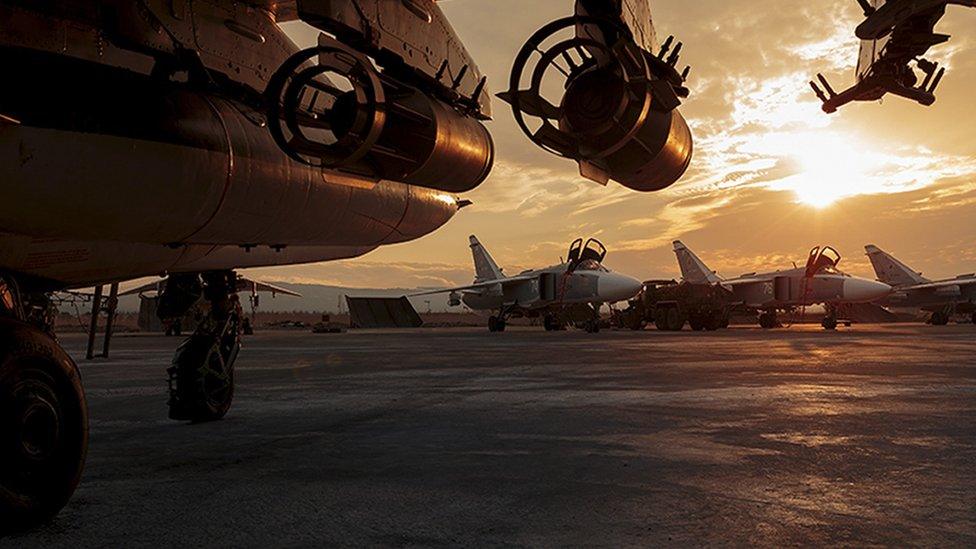Russia in Syria: 'Victory' in war but can Moscow win the peace?
- Published
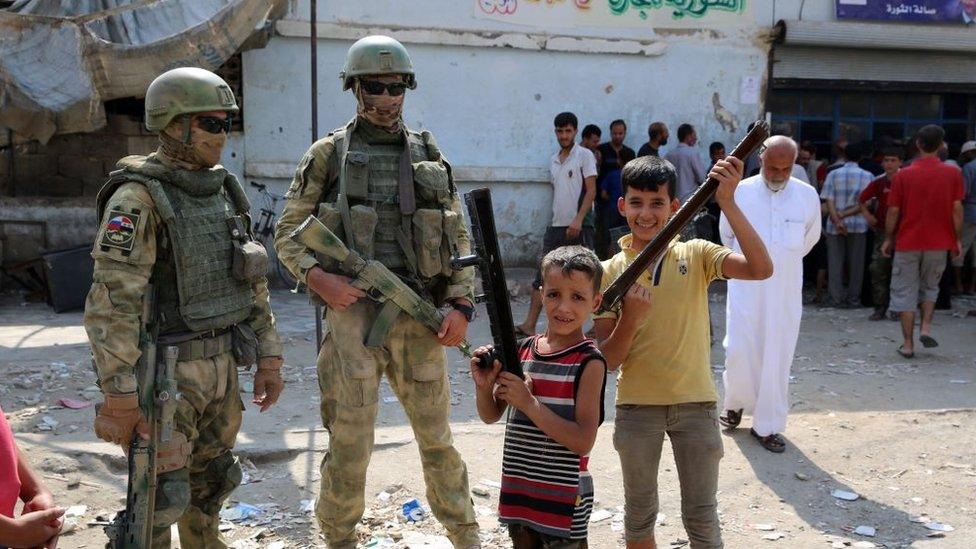
Russian troops have been on the ground in Syria
Russia has emerged from the Syrian crisis with its military and diplomatic reputation significantly enhanced. But this has been achieved amid huge controversy over the means used and amid much international criticism.
It has ensured the survival of the Assad regime at the same time expanding its own small military footprint in the country. But the diplomatic ramifications too have been considerable.
It, not the United States, is the "go to" player. Russia is marshalling a loose alliance of Iran and Turkey to try to plot Syria's future. Even the Saudis have had to beat a path to Moscow's door.
Russia drew its own lessons from a series of Western military interventions over the past two decades. It watched with alarm as the US and its allies hailed the upheavals of the Arab Spring as the dawn of a new era of democracy in the Middle East.
Russia's conclusions were more pragmatic and more pessimistic. And it subsequently applied those lessons in Syria.
Russia did not see the popular rebellion there as the positive harbinger of a new democratic order. Rather it was seen as part of a wider tide of instability rising across the region that threatened to lap over Russia's own borders.
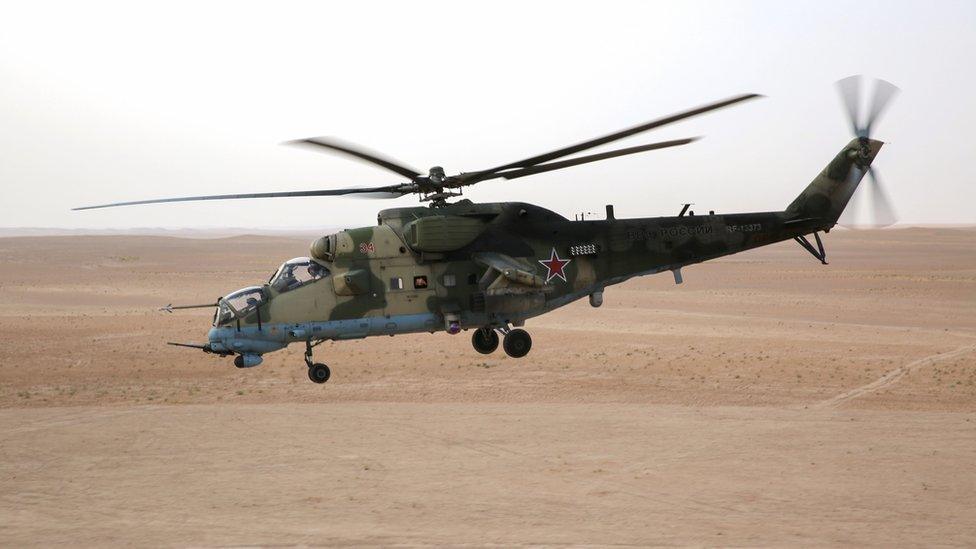
Russian air power has helped Syrian government forces recapture territory - but not without controversy
Crucially, it made a pragmatic assessment of the situation. It chose to stick with its long-time ally, Mr Assad. It defined its strategic goals quite narrowly and, crucially, it deployed sufficient military force to carry them out. In short, it saw an opportunity and acted.
Russian air power, special forces and equipment gave a military backbone to President Assad's crumbling forces, with Iran's allies like Hezbollah and various other Shia militias providing badly needed foot soldiers.
Together they allowed President Assad to defeat both rebel forces and so-called Islamic State across a significant part of the country. Syrian government forces and their allies have taken back all of Syria's major population centres.
The opposition is not totally destroyed but it is largely demoralised.
As Prof Joshua Landis, a Syrian expert at the University of Oklahoma, told me: "There remain a number of militias that have not given up and continue to win foreign backing, but they are almost uniquely arranged along the border with Turkey.
"They will continue to give Assad a hard time, until he crushes them or comes to terms with Turkey about their disposition.
"Otherwise," he argues, "the opposition has been largely dismantled. It is possible that secret cells will try to carry on with strikes on government buildings and explosions in crowded markets, but the Assad government demonstrated considerable skill and ruthlessness in rolling up such terror organisations before the uprising broke out."
Russia has achieved this "victory" - if you want to call it that - by the simple exercise of realpolitik with little concern about what its many critics would call the morality of its actions.
Russia sided with a regime that many people believe was not just turning its guns on its own people but was carrying out war crimes. It has shielded the Syrian government from pressure over strongly based allegations that it has used banned sarin gas and other chemical weapons.
The Russian air campaign obeyed its own rules and typically used large numbers of "dumb" or unguided bombs and missiles.

The US and its allies have tended to use largely precision-guided weapons in their operations over Iraq and Syria. (These, of course, still kill innocent civilians, often far more than the military spokesmen are prepared to admit.)
But the fact remains that Western air power, mindful, not least, of public opinion at home, does go to great lengths to minimise civilian casualties as far as possible. Russia's leaders have no such constraints.
And to the extent that Russian domestic opinion is a factor, Mr Putin has achieved success in Syria with relatively few Russian casualties and with a relatively limited military deployment.
So is it all over for the Syrian opposition? Prof Landis says that "it will be very hard for those that live in exile to maintain a serious military option in the future so long as Syria's neighbours are unwilling to sponsor them and provide them safe havens as they were in the past.
"Of course," he notes, "millions of Syrian opposition members now living as refugees or outside the country revile Putin and Russia and continue to look to Western governments to destroy the Syrian regime and return them to their country.
"Like the White Russians of 100 years ago, (the exiled conservative opponents of the Bolshevik Revolution) they are likely to be disappointed."
Russia has secured a military victory but can it win the "peace"? Well it emerges from this crisis with its diplomatic hand strengthened. In many ways it outplayed the Obama administration - Washington's efforts to build and arm a coherent Syrian opposition collapsed a number of times - and it has run rings round President Trump's team.
Some of Washington's allies like Turkey, who had long called for President Assad's removal, ultimately decided that they needed to secure their own strategic interests. For Ankara this is the prevention of the emergence of any autonomous Kurdish entity and thus they have thrown in their lot with Moscow and Tehran.
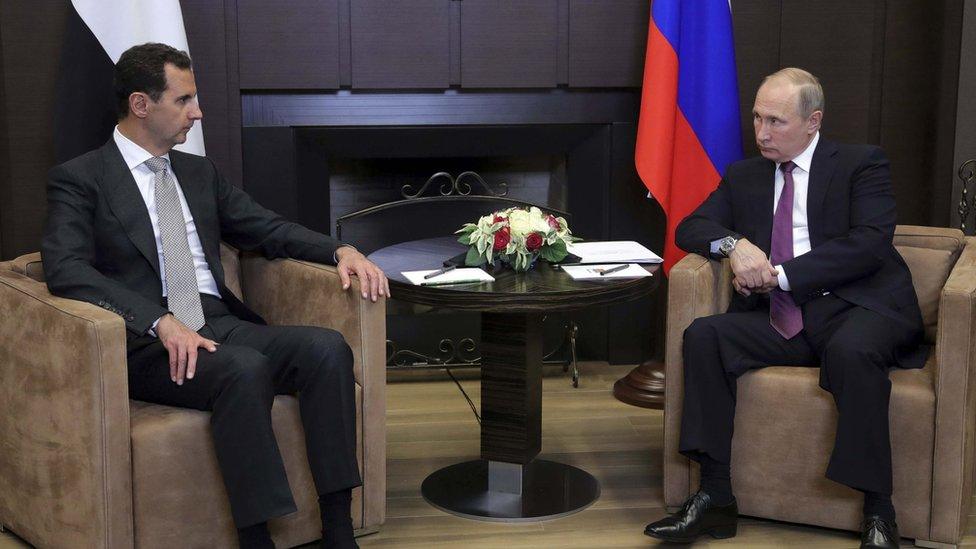
Russia's President Putin (r) recently met Syria's President Bashar al-Assad in the Black Sea resort of Sochi
The Trump administration is yet to elaborate a coherent policy towards Syria or indeed for its broader goal of containing Iran's rising regional influence. It has few levers to pull. The only successful element of US strategy has been its support for and arming of Kurdish fighters.
If the US maintains its support for the Kurds then Joshua Landis says Washington "will be able to beggar the Syrian government and maintain leverage in the region. The US has helped the Kurds take control of most of Syria's oil and gas fields. This means that Syria will have a much harder time rebuilding.
"The US effort to keep Damascus weak and poor", he says, "will also limit the victory of both Russia and Iran in the region. But strategically, by choosing to side with the Kurds, Washington will continue to alienate Turkey, Syria and Iraq."
But Mr Trump's stance towards the Kurds seems clouded in uncertainty with reports emerging that he has assured the Turks that arms supplies to Kurdish fighters will now be halted in the wake of IS's defeat. As so often with this presidency the news seems to have caught other members of the administration off balance. Such a stance may help to pacify Ankara but it will be seen as a betrayal by the Kurds and may weaken them if the Syrian government decides to go onto the offensive.
Russia too may face diplomatic problems ahead. Moscow, Damascus, Ankara and Tehran may be united for now, but their medium-term strategic goals may differ.
Russia is under pressure from the Israelis to curb Iran's influence in Syria. Israel may not be able to bring much diplomatic pressure to bear on Moscow but it clearly has the military power to seek to influence developments in Syria if it feels threatened. And will Turkey, Russia and Iran continue to see eye-to-eye ?
Russia's real plans for Syria's future are unclear. It has assiduously worked with some opposition groups to bring them into local ceasefire arrangements. But this is essentially short-term. Will these hold?
Will the Syrian regime have the manpower to maintain its control over the areas it has recaptured? Will the Shia militias and Hezbollah remain in the country? And whose interests will they be serving, Syria's or Iran's?
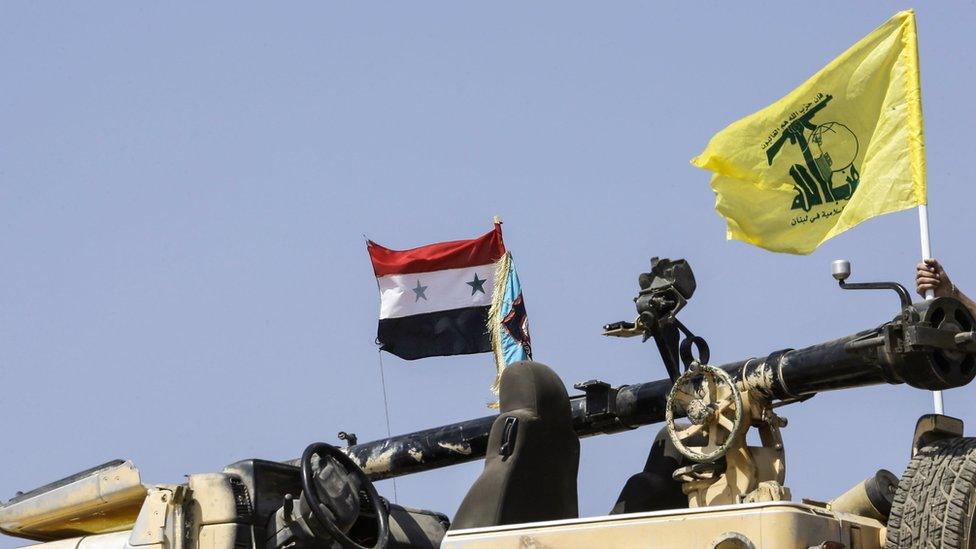
Syrian forces have been assisted by those of Hezbollah, whose flag is seen on the right
Russia's "victory" - if you want to call it that - is far from complete. If Moscow really has a plan for Syria, few details have been provided so far.
Russia certainly has a whip hand over the developing peace process, but its goals remain opaque. Will President Assad himself remain a fixture or merely the regime that he represents?
For now though, Mr Putin has many achievements that he can bank. Russia has been shown to be a reliable ally. Its military forces have shown their ability to mount a complex expeditionary operation. Syria has provided a "shop-window" for many of Russia's most modern weapons systems.
Russia is again a significant diplomatic player in the Middle East in a way that it has not been since the early 1970s. Indeed then it was probably already a waning force. Today it is a rising one facing a US diplomatic effort that is largely incoherent.
Russia is back on the world stage. And if you set aside the misery and suffering in Syria to which all of the external actors have contributed, that ranks as an achievement in Mr Putin's playbook.
- Published21 November 2017
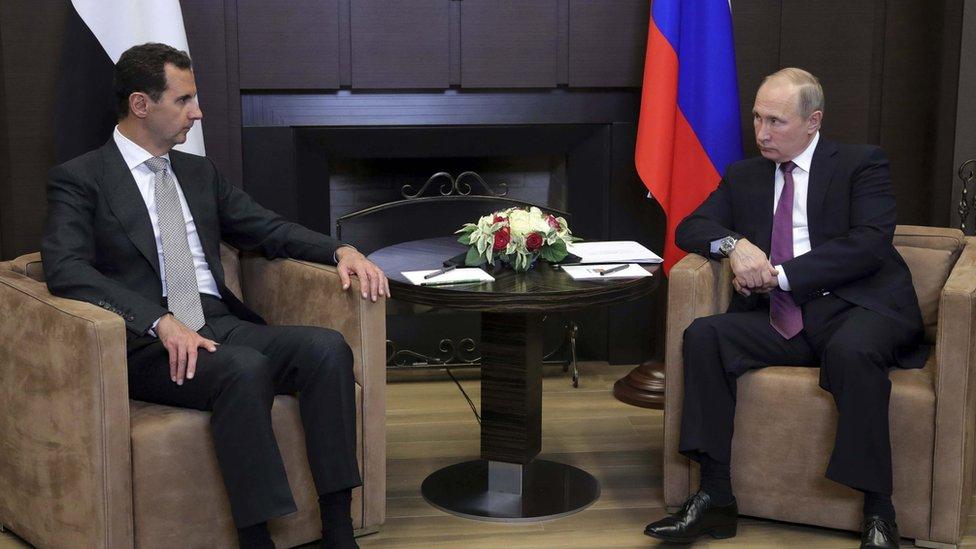
- Published4 November 2017
- Published27 October 2017

- Published2 May 2023

- Published30 September 2016
- Published14 March 2016
